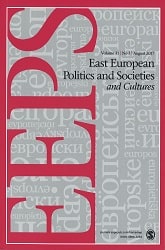The Spirituality of Václav Havel in Its Czech and American Contexts. Between Unitarianism and New Age, T. G. Masaryk and Kampademia
The Spirituality of Václav Havel in Its Czech and American Contexts. Between Unitarianism and New Age, T. G. Masaryk and Kampademia
Author(s): Martin C. PutnaSubject(s): Christian Theology and Religion, Political Philosophy, Contemporary Philosophy, Philosophy of Religion, Sociology of Religion
Published by: SAGE Publications Ltd
Keywords: Vaclav Havel; Czech spirituality; Unitarianism; American religious thought; New Age;
Summary/Abstract: The religious thought of Václav Havel is examined in the context of Czech and American intellectual and spiritual traditions. The line begins with the worldview canonized by T. G. Masaryk. Masaryk drew inspiration from the American tradition of religious thought, rooted in the Enlightenment deistic interpretation of Christianity, embodied in Unitarianism. It was this line of thought that was passed down to Václav Havel by his father V. M. Havel. Masaryk’s “Unitarian” style of thinking about religion was developed by Havel in his Letters to Olga. During the 1970s, this influence merges with another intellectual stream, the “Kampademia” group. This line of thought combines Patočka’s tradition of phenomenology with new philosophical approaches to Catholicism and stimulated by the American “New Science”. According to Masaryk’s “enlightened” and “Unitarian” tradition, old religion, expressed with the aid of rituals, was to be surpassed and replaced by a “scientific” and “progressive” religion. For the tradition of Kampademia, on the other hand, it is this old religion, with its myths and rituals, that should be revived. Thus, Havel takes seriously the basis of all ancient spiritual traditions—Christian, Jewish, “heathen,” hermetic. It is in this public and symbolic appeal to “old” religious traditions before the eyes of a secular Czech society, this readiness to learn from the experiences of other traditions, and the declared humility to not attempt a synthesis of these traditions (as according to “classic” New Age) that Havel’s primary contribution to the spiritual thought of the present can be found.
Journal: East European Politics and Societies
- Issue Year: 24/2010
- Issue No: 03
- Page Range: 353-378
- Page Count: 26
- Language: English
- Content File-PDF

